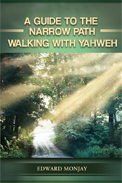
 |
In the author's view, Christmas, Easter, and all other Christian holidays are pagan celebrations. The Hebrew Torah lists 711 sins that displease Yahweh, including observances of such non-Jewish festivals. It is possible not to commit such transgressions if one obeys specific scriptures that address them. Strict adherence to these principles starts with calling God by His true Hebrew name of Yahweh, and not, for example, God or Lord, which derive from pagan gods' names. Yahweh is a God of mercy and grace, and Yahshua, His son, was the embodiment of those attributes. But exactly how powerful is divine grace? Can a person lose their salvation? Is it possible to live under the law and grace at the same time? Which laws of the Torah should modern seekers of the truth keep, and with which can they dispense? Anyone seeking unadorned answers to these and other questions about righteous living may find them here.
The author's search for truth and the right way to live led him to write this guide. He readily admits that his ideas regarding faith and the modern Christian church are unconventional. He cautions that those who hold them may begin both to be perceived by others as "different" and to question their own, sometimes long-held beliefs. Monjay once adhered to the doctrines of traditional Christianity but asserts that Yahweh eventually revealed to him the principles he puts forth here, showing him scripture that substantiated each teaching. Some may be put off by the frequent unapologetic use of the phrase "You are wrong," whereby Monjay seeks to debunk common beliefs that contradict his own. Except where otherwise noted, scriptural citations come from the Hebrew Roots Version of the Bible. The text might especially interest students of conservative Judaism who desire a literal interpretation of ancient Jewish scripture.